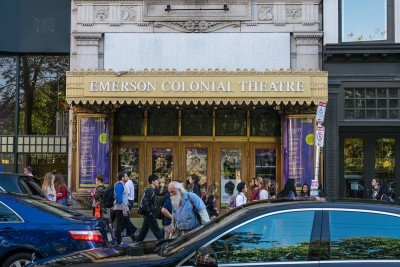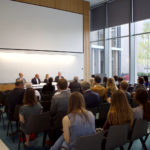
Emerson Colonial Theatre, owned by Emerson College, is considering partnerships with various art organizations to reopen the theater after a year-long operations hiatus, according to Emerson spokesperson Carole McFall.
“The College understands the historic and cultural value of the Colonial in Boston and beyond and its significance for our campus community, the theater-producing community, and the public,” McFall wrote in an email. “With this in mind, we are carefully considering each proposal.”
Emerson did not disclose the entities with which it is considering partnering. However, Gary Dunning, the president of Celebrity Series of Boston, wrote in an email that the performance organization has submitted a proposal to Emerson.
The CSB would like to maintain the 116-year-old performance venue for the continuation of “a long and storied history of Boston theaters,” Dunning wrote.
“Celebrity Series joins many others who would like to see it continue as a performing arts venue,” he wrote. “We believe that, with appropriate theater operator and operating structure, Celebrity Series could bring performances into the mix.”
The theater closed last year after the theater’s engagement of “The Book of Mormon” while the college considered repurposing the building, Emerson President Lee Pelton wrote in an October 2015 community letter.
Among the plans considered were converting the space into “Emerson’s social and dining spaces” and creating a black box theater, where 300 of the existing 600 seats would be transformed into a reversible dining area, Pelton wrote.
“The College has been an enviable and proven track record of being a good steward of Boston’s historic spaces,” Pelton wrote, “and we will live up to that responsibility in regard to the future of the Colonial Theatre, ever mindful that we are also a learning community.”
To Brooke Knight, a visual and media arts professor at Emerson, the Colonial Theatre serves as “an important piece of Boston history,” and he said various entities’ willingness to use the performance space could also be beneficial.
Knight said the Colonial Theatre needs repairs, and its operations are not yet efficient. Emerson had reasonable means to consider repurposing last year, he said, as expanding facilities in an urban area may be more challenging than in the suburbs.
“The college is really strapped for space overall,” Knight said. “In an urban area like Boston, where real estate’s really expensive, space is at a premium.”
Several students welcomed the theater’s potential reopening, lauding the building’s historical value.
Zoe Lyrintzis, an Emerson senior studying journalism, said the theater enhances the college’s creative environment and serves as a vital cultural object.
“I recently had the opportunity to explore the inside of the theater, and I feel it has been vastly underrated how ornate and detailed the inside of the theater is,” she said. “Emerson is located right in the theater district of downtown Boston, so closing a major theater in the theater district was a big blow to the culture of the area.”
Esiri Madagwa, a sophomore in Boston University’s College of Engineering, said the theater is a window to the artistic world for the community.
“It just gives people more of an opportunity to see what’s really going on in the arts,” said Madagwa, who is also involved in the theater group BU on Broadway. “It allows people to get exposed to the wonderful world of theater and arts. It’s better for the community in general.”
Joe Hornberger, an Emerson senior studying acting, said the Colonial Theatre is an essential building that should not be repurposed.
“To just turn it into a library or a restaurant or a dining hall for 18-to-21-year-olds … that’s extremely appalling,” he said. “If the school is so worried about making our student population, expand campus in an appropriate way, don’t extend campus by knocking down history.”




